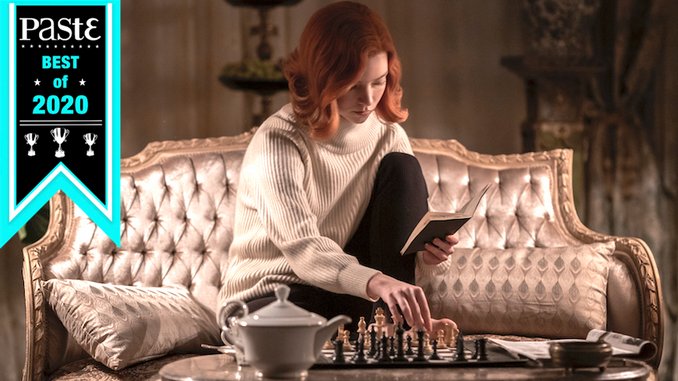
In a TV landscape where bingeing shows has become more common, the art of the episode can be easily lost. Notably on the following list of the best episodes of the year, only a few are from streaming networks (which, in general, featured heavily in our Best TV of the Year list). While we may love a series as a whole, it’s not always easy to pick out a defining episode when you binge an entire season at once. And yet, there is some hope that maybe crafting episodes is coming back in style.
Below, we Paste TV writers have compiled some of our favorite standouts from the year, unranked. To be eligible for the list, episodes had to air between January 1 and November 20, 2020 (even if the majority of their seasons did not), and we held ourselves to just one choice per series. And if you aren’t caught up with any of the shows below, there are some mild spoilers, so just glide on past to the next one. (Also, why 21? Because “20 of 2020” was a little too on the nose).
“The Marshal,” The Mandalorian
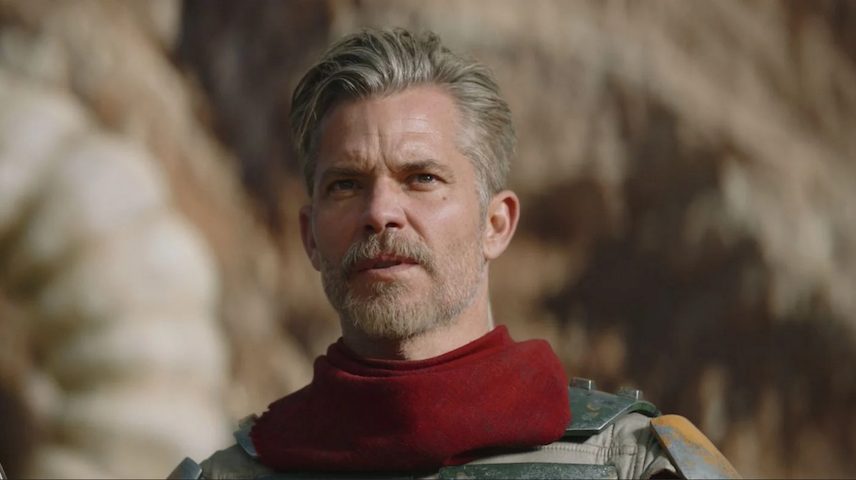
Written by: Jon Favreau
Directed by: Jon Favreau
Network: Disney+
You may be surprised to find that our best episode pick for The Mandalorian is one that featured only a little of our beloved Grogu. But “The Marshal” was an installment that showcased the series at its best in all regards: Tying into Star Wars lore (the Boba Fett armor), introducing a fun celebrity guest star (Timothy Olyphant), using a combination of practical effects and CGI (the wooly livestock and the sand dragon), meaningful inclusion (the Tuskens using sign language that wasn’t translated in captioning), pop culture references (Olyphant having played a marshal in two other excellent series), and of course the strong bond between Mando and Grogu. It set a high bar that the season has, with minor exceptions, consistently continued to meet. Also, it’s just a ton of fun. —Allison Keene
“Bagman,” Better Call Saul
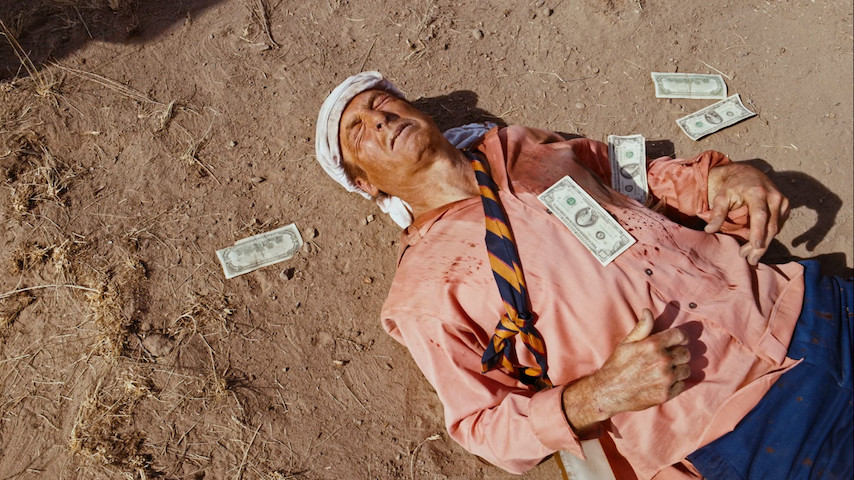
Written by: Gordon Smith
Directed by: Vince Gilligan
Network: AMC
On AMC’s Breaking Bad, Bryan Cranston’s anti-hero Walter White was an upstanding person who continued to be dealt bad hands—left behind by his business partner; taken for granted by bratty high schoolers; emasculated by his brother-in-law; cancer—so that the early seasons of that show were a morality play for his soul. Bob Odenkirk’s Jimmy McGill (aka Saul Goodman) in the series’ prequel, Better Call Saul is the opposite; he’s a slippery con artist who just can’t ignore the naughty demon on his shoulder. In the five seasons of Saul that we’ve seen so far, Jimmy has encapsulated so many of Christianity’s seven deadly sins: envy of his brother Chuck (Michael McKean); wrath at Chuck and others, like Patrick Fabian’s pinstripe suit-obsessed attorney Howard Hamlin; and pride when he struggles to be taken seriously by them and others. In Saul’s fifth season episode, “Bagman,” Jimmy strikes off another: greed.
In fact, almost none of the events of the seasons eighth episode would have happened if Jimmy hadn’t been so greedy. Where would he be if he hadn’t offered his services of procuring two large duffle bags of bail money for his mobbed-up client Lalo Salamanca (Tony Dalton) in exchange for $100,000? He wouldn’t have had to drive out to an area with no cell reception on a hot day. He wouldn’t have been mugged by a rival gang after the drop. He wouldn’t have been nearly shot point-blank in the face and rescued at the last minute by ace sniper-in-hiding Mike (Jonathan Banks). He wouldn’t have had to abandon his beloved Suzuki Esteem after it was riddled with bullet holes (RIP). And he and Mike wouldn’t have had to bond as they walked through the blistering New Mexico dessert like they were in Lawrence of Arabia.
Jimmy clearly thought of all of this during his walk through the sand, the heavy duffle bags bruising his shoulders and the climate making him so dehydrated that he had to drink his own urine. But he survived it. He even somehow managed to hold onto his money and not get dumped by his wife, Kim Wexler (Rhea Seehorn). And, because he’s Jimmy, he sees this as a learning experience in survival. Sure, he’s game to take on another risky activity because what shenanigans can be worse then this? There’s only one more season of Saul left, so who knows which if any other cardinal vices Jimmy will partake of before the show ends. But, speaking for those of us who truly love Kim, please don’t let it be lust. —Whitney Friedlander
“Kristy’s Big Day,” The Baby-Sitters Club
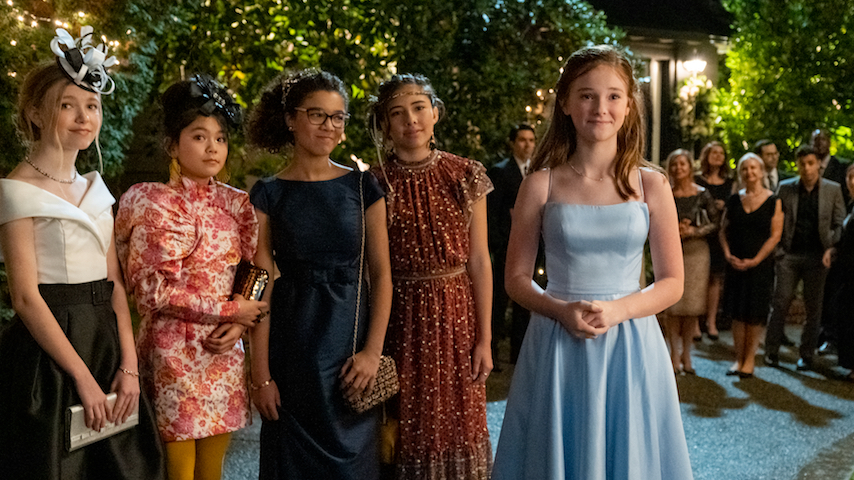
Written by: Rachel Shukert
Directed by: Kimmy Gatewood
Network: Netflix
Netflix’s The Baby-Sitters Club is a beautiful love letter to both preteen friendship and the nostalgia with which we all look back on it, a show that has basically been designed in a lab to appeal to both younger viewers and the now middle-aged women who grew up with the books upon which the show is based. It is unabashed in its sentiment, honest in its emotional complexity, and genuinely joyous in a way that few things on television managed in this hell year. Nowhere are all of these traits more fully realized than in the episode “Kristy’s Big Day,” which sees Liz Thomas marry Watson Brewer, Kristy get her period, and the girls realize that there’s no situation that cannot be made better by dancing it out.
This episode is basically twenty-four straight minutes of warm, lovely emotional catharsis. (When I say I cried, I mean, I CRIED.) From Kristy’s realization that her mom is a real human being with fears and flaws to the BSC’s showing up for their fearless leader in the bathroom at the reception with feminine products and life advice, not a single moment is wasted and every scene is glorious. The story beautifully balances Kristy and her mother’s individual and collective anxieties about the ways their family’s life will change post-wedding, while slyly allowing us, those aforementioned middle-aged female viewers, to stand in the space between them, and embrace both at once. If only more TV were like this. —Lacy Baugher
“Are You from Pinner?” Killing Eve
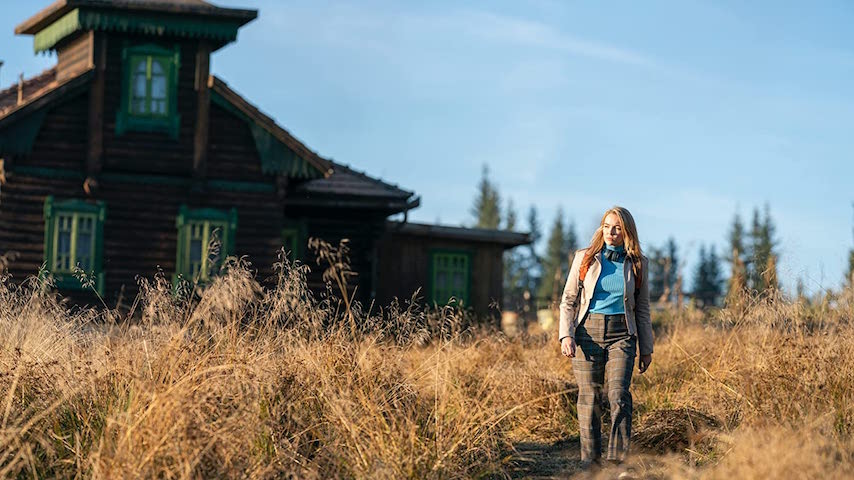
Written by: Suzanne Heathcote
Directed by: Shannon Murphy
Network: BBC America
In a season focused so heavily on Villanelle over Eve, it’s no wonder that the Villanelle-centric “Are You from Pinner?” was a season highlight and overall standout. At long last, our favorite fashionable assassin returned home to Mother Russia, where we got a glimpse of her family and home life. Ultimately it was fraught with a mother-daughter confrontation for the ages, but before that, the wonderful carnival-like strangeness that tends to follow Villanelle everywhere she goes was on full display in Pinner. From her half-brother Bor’ka’s obsession with Elton John, to the throwback Harvest Festival activities, to reuniting with her shy brother Pyotr, the return to Russia was triumphant, funny, and ultimately heartbreaking—the best kind of Killing Eve episode. —Allison Keene
“Room 320,” Evil
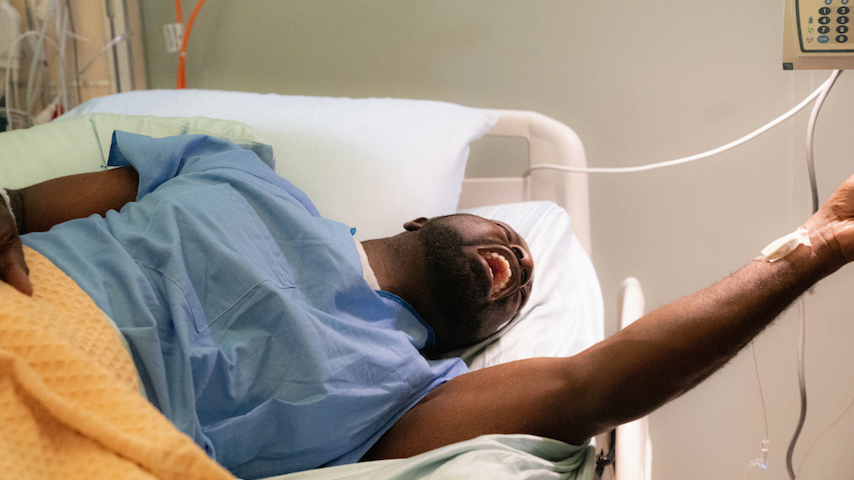
Written by: Aurin Squire
Directed by: Peter Sollett
Network: CBS All Access
Evil has always really been a horror series, but few episodes were as viscerally disturbing as “Room 320.” And of course now, the episode’s main conflict—that David becomes victimized by an “Angel of Death” nurse who drugs and kills black patients—resonates even more horrifically. Being trapped and unable to speak up for yourself even as there are those nearby who could help you is one of the most terrifying things to bear witness to, let alone experience. Like The Good Wife and The Good Fight, Evil has never shied away from exploring racial inequality, but the collection of wristband trophies by the nurse who ultimately escapes is still one of the most harrowing combination of story elements on television this year. The only resolution was that David was ultimately saved—justice was never served. Throughout a lot of TV turnover this year, that dark truth has never left me. —Allison Keene
“On the Run,” What We Do in the Shadows
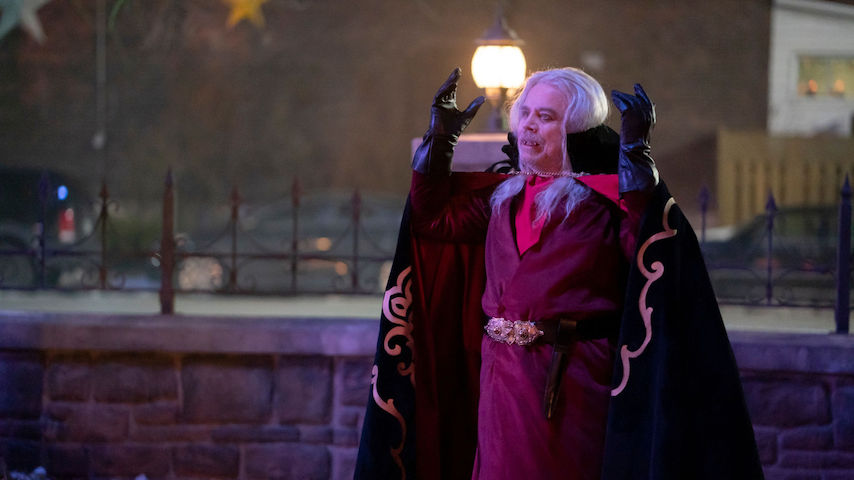
Written by: Stefani Robinson
Directed by: Yana Gorskaya
Network: FX
The ballad of Jackie Daytona will ring out in pool halls and watering holes across this fertile land we living souls call “the HUGH-nited States of A-MER-ica.” That’s how I’d like to think the bartender, who acts as an alias for Laszlo (Matt Berry) while the vampire is on the run from an old rent debt, would describe his fate by episode’s end. Just a few simple wardrobe tweaks (blue jeans and a toothpick) turns the show-stealing Berry into the show-stealing Daytona, whose pronunciations are even more enthralling (“Tempe, Arizonia!”) than in his usual undead delivery. Moving at a quick clip, with each innocuous twist and turn in the story standing in stark opposition to the show’s sometimes lackadaisical pacing, the episode is a much-needed standalone jolt of fun in the heart of What We Do in the Shadows’ second season. An all-time guest star in Mark Hamill, the best Big Mouth Billy Bass TV gag since The Sopranos, and a delightful amalgamation of ‘80s-style community fundraiser plotting make “On the Run” an impeccable episode of TV. And Berry’s performance makes it an all-time entry into the oddball comedy canon.—Jacob Oller
“Please, Baby, Please,” black-ish
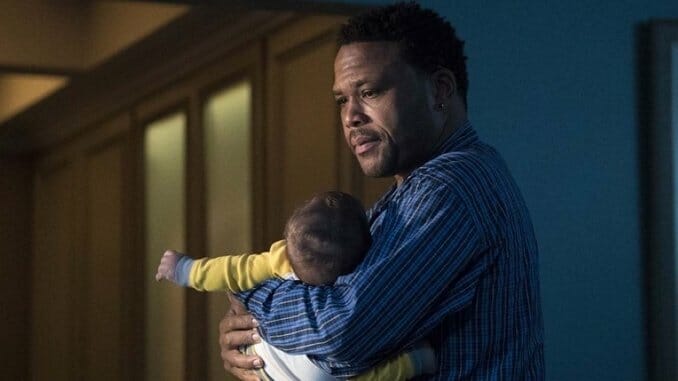
Written by: Kenya Barris and Peter Saji
Directed by: Kenya Barris
Network: Hulu
Two years ago ABC kicked up some controversy when it decided, pretty much at the last minute, to not air an episode of black-ish about the polarized political situation in America. “Please, Baby, Please” was originally scheduled to air in March 2018, but was pulled a few days beforehand over concerns that it would anger conservatives and Trump supporters. This was one of the reasons black-ish creator Kenya Barris left ABC for a deal at Netflix later that year. The episode, which was widely reported to focus on the controversy over Colin Kaepernick and other athletes kneeling during the national anthem, was shelved indefinitely, and to this day represents the mainstream media’s cowardice and failure to address the issues undermining our country.
But “Please, Baby, Please” snuck quietly onto Hulu this year. Watching it only makes ABC look even more cowardly than they already did. Yes, it’s explicitly critical of Trump, police brutality, the rise of the far right, and inaction over climate change, and uses copious amounts of news footage and stock film to make sure nobody can mistake who and what it’s talking about; and yes, Trump supporters and the grievance mongers in the right-wing mediasphere would have feasted on this episode when it aired. None of it is factually incorrect, though, and the episode’s fears and concerns reflect those of a large percentage of Americans. Many people would’ve felt seen and supported by the episode, while those who were offended or acted outraged by it are exactly the kind of people who should be mocked and insulted out of the public spotlight. Nobody should worry if racists are upset when their racism is pointed out to them, which is essentially what this episode does.
Calling out racists isn’t the point of “Please, Baby, Please,” though. Its goal is to explore the fear, stress, and pain that today’s political climate inflicts upon us—how the daily burden of living in this fractured, hateful society weighs on us all, especially those who aren’t white. —Garrett Martin
“Make Rebecca Great Again,” Ted Lasso
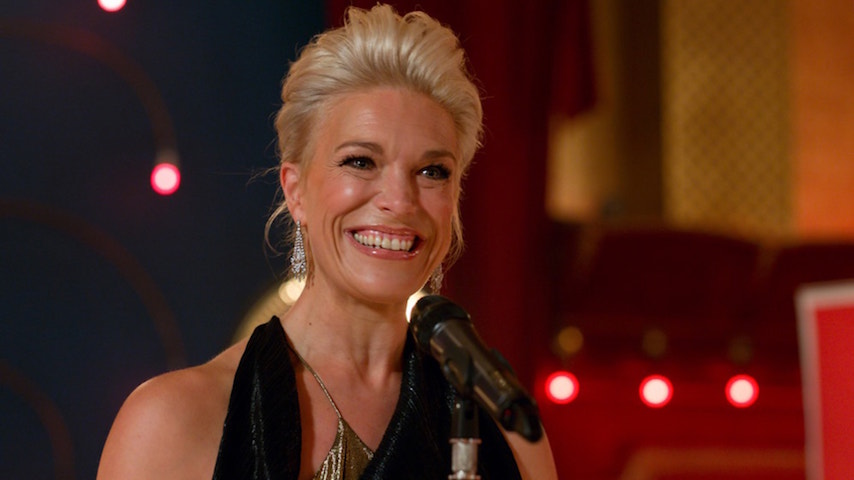
Written by: Jason Sudeikis (teleplay), Joe Kelly (story), Brendan Hunt (story)
Directed by: Declan Lowney
Network: Apple TV+
It’s tough to find any real darkness in Apple TV’s feel-great football hit, Ted Lasso, but that doesn’t mean there’s none to be had. How could there not be? Its leads, after all, start the season from a position of deeply suppressed grief—Ted (series co-creator Jason Sudeikis), over the supportive marriage he knows he’s about to lose; Rebecca (Hannah Waddingham), over the self she lost to a toxic marriage she’s ferociously glad to be rid of. Thankfully, wherever conflict (or darkness) on Ted Lasso goes, unflinching introspection and grace are close on its heels—Ted Lasso, my friends, *loves* an honest apology.
This is true throughout the show’s incandescently warm first season, but nowhere is it more evident than in its rollicking road-game episode, “Make Rebecca Great Again,” which, on the same weekend that marks both the official end of Ted’s marriage and the first anniversary of Rebecca’s imploded marriage to pass since her own inglorious divorce, sends Richmond off to Liverpool to play a team they haven’t beaten since Elvis was top of the charts. In the process, it introduces us to 1) Rebecca finally owning up to her own part in losing herself for so long, courtesy the surprise arrival of Flo (Ellie Taylor), the no-bullshit childhood BFF Rebecca abandoned while she was with Rupert; 2) Rebecca’s remarkable singing voice, courtesy a surprise rendition of “Let it Go” at post-victory team karaoke; 3) Ted at his unpolished, unsmiling, panic-attacked worst, courtesy the last of the digital paperwork that will make his divorce real.
The subtlety of those emotional beats would be tricky enough for any show to juggle successfully, but, thanks to each of the narrative’s central characters showing willingness to both admit fault and extend grace, “Make Rebecca Great Again” pulls them all off with grace. What’s more, it manages to counterbalance the seriousness of it all with the pop of glittery support Keely (Juno Temple) brings to any scene she shares with another woman, and the deeply sweet background notes of the team 1) crying over The Iron Giant (thanks, Coach Beard, for the Kleenex) and 2) suffering the laser precision of Nate’s pre-game burns (in the words of Dani Roja, “Roast me, amigo!”). That it brings Richmond their first victory against Everton in decades, or Keely and Roy their first kiss after a long road of almost? Icing on the (not) anniversary cake. —Alexis Gunderson
“Peter,” Dispatches from Elsewhere
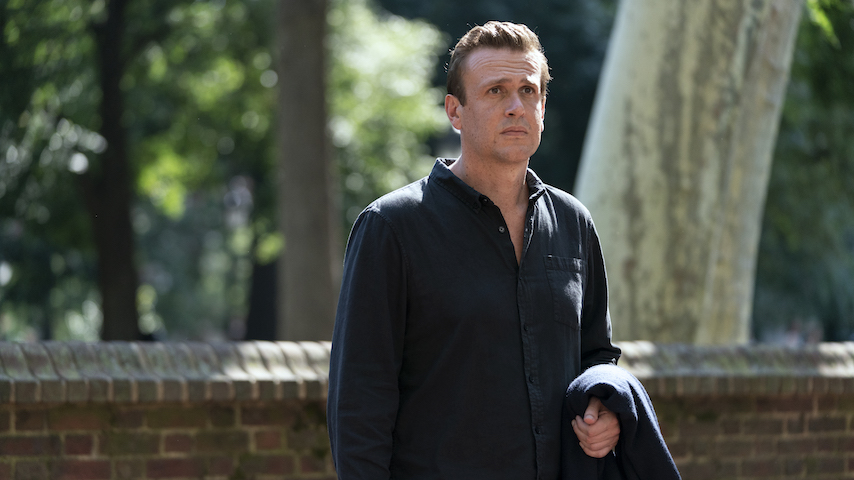
Written by: Jason Segal
Directed by: Jason Segal
Network: AMC
What with the overwhelming volume of television vying for critics’ attention these last many years, it’s become increasingly hard to find something that, across the board, renders our lot not just surprised, but at a loss for the words to articulate why. And yet, “Peter,” the pilot episode of Jason Segal’s AMC passion project, Dispatches from Elsewhere, did just that. The week after it premiered, as Paste’s editors and contributors gathered in our inboxes for our regularly Power Rankings discussion, the two things we could all agree on were 1) Dispatches from Elsewhere was truly something special, and 2) whatever “Peter” had been about (what could a Bigfoot dance party, a personalized puzzle game, and an uncomfortably piercing Richard E. Grant possibly have in common?), it had made us all cry. We didn’t know why. We didn’t know where Dispatches could possibly be going. We did know that Segal had a vision, and we knew, too, that Sally Field, André Benjamin, and especially newcomer Eve Lindley, were exquisitely cast as his title character’s emotional foils. And at the end of the day, that was enough. We, like Peter, were all in. —Alexis Gunderson
“The Beaver’s Nose,” The Great
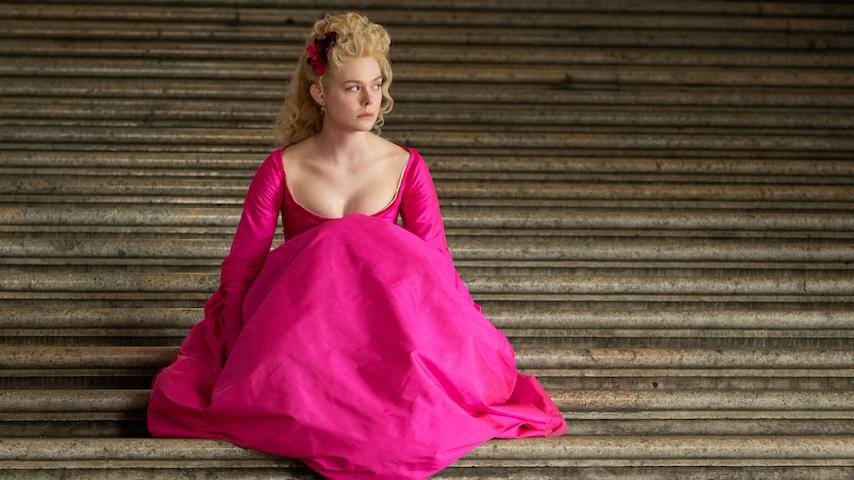
Written by: Vanessa Alexander, Tony McNamara, Gretel Vella
Directed by: Geeta Patel
Network: Hulu
Huzzah! As a finale episode, “The Beaver’s Nose” manages to encompass everything that’s, well, great about Hulu’s The Great into a single hour of television. There is literally no better argument that this series deserves a second season than this installment, which features Catherine attempting a coup for her birthday, Peter bringing the wife he’s realized he’s in love with a French philosopher as a gift, Aunt Elizabeth supporting a female-led revolution, and general palace chaos.
Watching her make difficult decisions, claim her power and decide that, as Elizabeth puts it, the unsaid better idea in her heart is worth the risk she’s taking is just utterly satisfying television. Elle Fanning’s performance is wonderfully layered and it feels, perhaps for the first time this season, as though Catherine might actually become a leader who will one day be worthy of the title “The Great.” And her co-star Nicholas Hoult is at his very best here, playing a Peter who is easy to love and hate in equal measure. (His greeting to his unborn son destroyed me. Please don’t kill him yet, show.)
The episode’s final moments are vague enough that it’s not clear precisely whether Catherine’s coup succeeds, whether Peter lives, or what precisely happens might happen next. (Well, mostly. Sorry, Leo.) But here’s hoping we get the chance to find out. —Lacy Baugher
“The Cowboy,” Little America
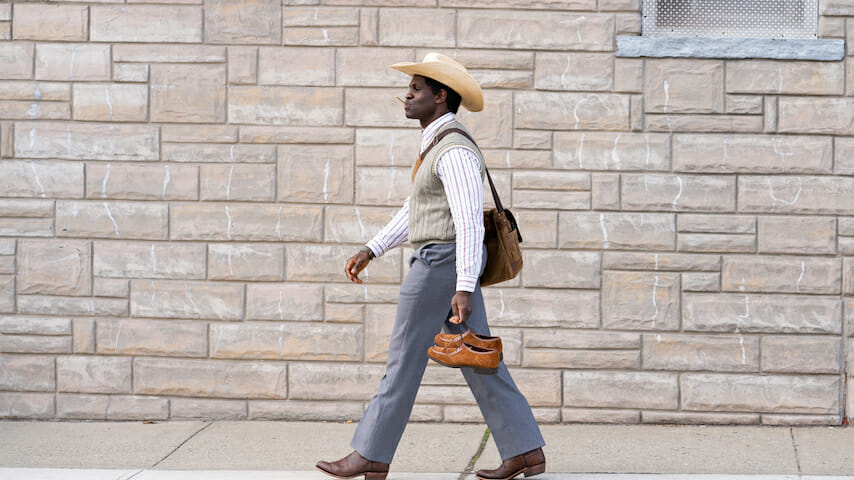
Written by: Brian Savelson & Mfoniso Udofia
Directed by: Bharat Nalluri
Network: Apple TV+
Boasting a robustly talented set of executive producers, including Kumail Nanjiani and Emily V. Gordon, Apple TV+’s anthology series Little America may be its best to date. Over the course of eight half-hour episodes, the show explores immigrant stories inspired by real events that are unique and full of heart. Though each story is incredibly different in terms of time and place, the series is united by a gorgeous, cinematic style and a theme of finding one’s home—often through unconventional means. The experiences are awkward, bittersweet, funny, raw, and triumphant, as each lead character follows their heart to create a new life in a new world. Some episodes feature recognizable actors, others do not; all will basically make you cry from their wonderful storytelling.
“The Cowboy” is such a standout episode of Little America even among these other incredible, moving installments because it is so wonderfully unique. Iwegbuna Ikeji (Conphidance) is a Nigerian student who wants to succeed in the U.S. but is told he’s off-putting and doesn’t really fit in. So, in the tradition of the state in which he is getting his higher education (Oklahoma), he becomes a cowboy. There are parts of the episode that are genuinely funny, but there are even more that are just incredibly wholesome and uplifting. “The Cowboy,” in particular, speaks to the very best of not just what America should be, but who we can be when we create inclusive communities. —Allison Keene
“The Beginning,” Raised by Wolves
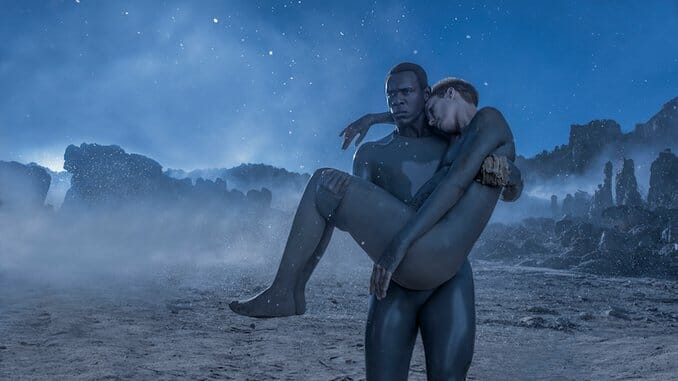
Written by: Aaron Guzikowski
Directed by: Luke Scott
Network: HBO Max
Frankly, I’m not sure what this was all about, but it was great. From the beginning, HBO Max’s Raised by Wolves defied my every expectation. It’s completely bonkers but totally compelling, with an incredible amount of lore that actually feels like it’s going somewhere. And yet, while its Season 1 finale, “The Beginning,” left me completely unsure of where that was exactly, it did so in the best of ways. It was exhilarating. It’s an absolutely mind-bending episode, but it was also exciting to consider what’s coming next (and thankfully there is a next—the show has been renewed for Season 2). To say more would be to spoil too much so I’ll leave it there. I don’t know what in Sol’s name I watched (giant flying tech-driven spirit eel baby), but I loved it and can’t wait for more. —Allison Keene
“Mr. Parker’s Cul-De-Sac,” Legends of Tomorrow
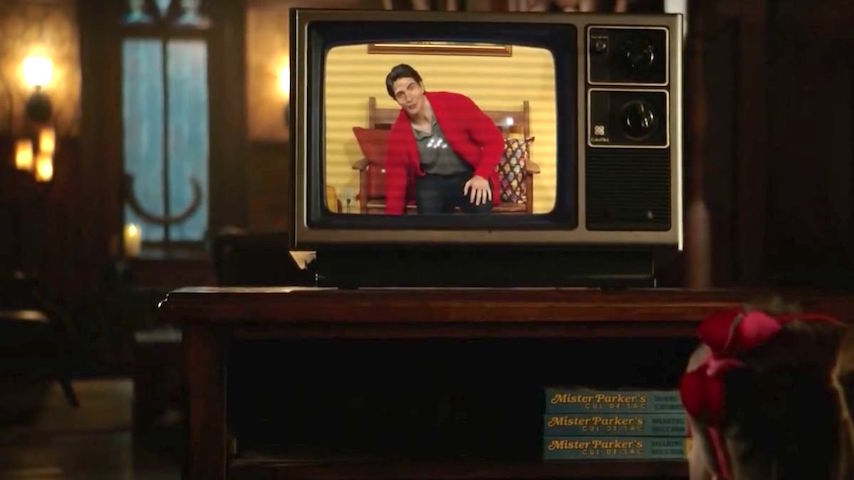
Written by: Keto Shimizu & James Eagan
Directed by: Ben Hernandez Bray
Network: The CW
There are so, so many things to love about this fifth season of Legends of Tomorrow that picking just one episode was nearly impossible. But “Mr. Parker’s Cul-De-Sac” truly had it all: Romance, deception, a honorable death, a manipulative child, a wedding, a catchy new song, and puppets! (Plus: “Gary the Unspeakable Train Abomination.”) Taking place in the Constantine mansion, an adorkable Ray finally proposed to Nora and the two had a makeshift wedding with Damian Darhk in attendance, giving all three a great out for the series (and Arrowverse in general) that they deserved. There was also that hilariously on-brand sideways shift into a show-within-a-show that gave our heroes the opportunity to talk through their problems in a Mr. Rogers-esque setting, where naturally some of them became puppets. Not to mention, Mick Rory finds out that he has a daughter (a throughline that became a great new direction for his character later in the season). As always with Legends, against all odds it somehow worked to bring us of one of the season’s most memorably bonkers, yet also wonderfully emotional episodes. —Allison Keene
“Three,” PEN15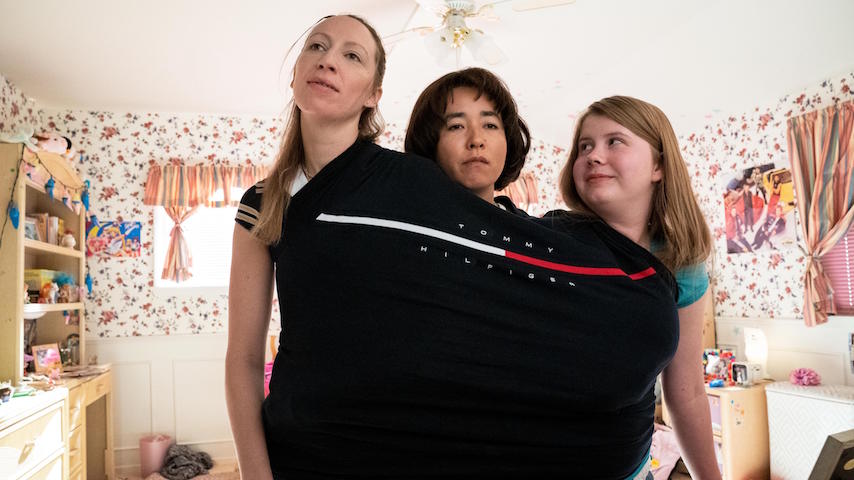
Written by: Vera Santamaria
Directed by: Sam Zvibleman
Network: Hulu
One of the things that bothered me about the first season of PEN15—creators Maya Erskine, Anna Konkle and Sam Zvibleman’s comedy that stars the first two as versions of their pubescent selves in the early aughts—is that, for all its acclaim and realism, it didn’t seem to depict a version of female friendships that I remembered because there was no backstabbing. Erskine and Konkle’s alter egos spend almost all their time together and, yet, are rarely sick of each other.
Enter Maura.
Played by actual teen-ager Ashlee Grubbs, Maura appears seemingly out of nowhere in “Three,” which is (somewhat annoyingly) the fourth episode of the second season. Under the guise of getting the three of them nominated as the class pick for “best best friends,” she also seems like she can drive a ringpop-sized wedge between our heroines through a stealth mind-trick of brand-name clothing superiority, snacks and casual racism. She also encourages Anna and Maya to act out against their mothers (respectively played by Melora Walters and Erskine’s actual mom, Mutsuko Erskine). An epic battle happens during a shopping trip, triggered by a fight over a men’s Tommy Hilfiger top. And, honestly, seen. —Whitney Friedlander
“Whenever You’re Ready,” The Good Place
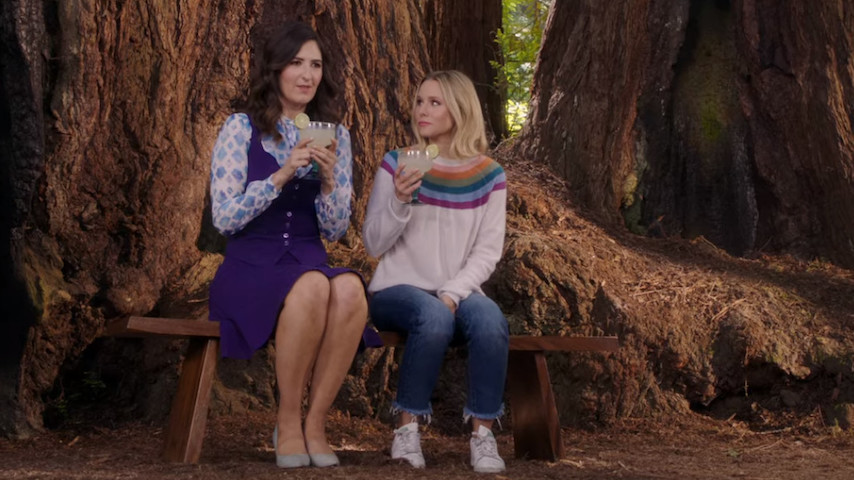
Written by: Michael Schur
Directed by: Michael Schur
Network: NBC
All good things must come to an end, and so too must The Good Place. The series ended not by having our six heroes—Michael, Eleanor, Chidi, Jason, Tahani and Janet—save humanity and get into the actual good place. In a bold move, they did that in the series’ penultimate episode. The series finale dealt with what came after you actually were living in paradise and had done all that you wanted to do, seen all that you wanted to see, and accomplished all that you want to accomplish. You had made peace with everyone and your relationships were thriving. What then? That was the process of letting go and becoming a “wave returning to the ocean” as Chidi so succinctly put it. Eleanor, Chidi, and Jason all had beautiful moments as they said goodbye and returned to the ether. While Michael got to be a human (and learn guitar!) and Tahani, having truly learned to put others before herself, became an afterlife architect. It’s rare for a series finale to be so deeply satisfying and to offer such a beautiful conclusion fraught with concepts we live our whole lives wrestling with. Throughout the tearful episode, all the humor remained razor sharp, the pop-culture references on-point, and the inherent sweetness of the series inspirational. Humans can get better, can learn from their mistakes and, against all odds, will try to do the right thing. Could a network comedy do all that? You better forking believe it. —Amy Amatangelo
“Zoey’s Extraordinary Silence,” Zoey’s Extraordinary Playlist
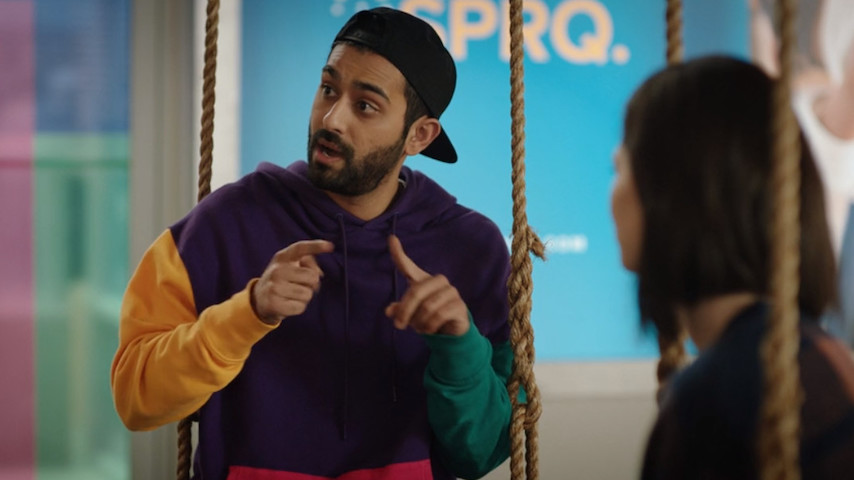
Written by: Matthew Irving Epstein
Directed by: Charles Stone III
Network: NBC
One of the best and most consistently surprising new series in recent memory—not just for an alphabet network, but across the board—Zoey’s Extraordinary Playlist made an art in its short first season of coming in week after week with some new, shockingly clever, and/or emotional twist on its “tech geek develops heart-song telepathy” premise. Still, when “Zoey’s Extraordinary Silence” landed late in the season’s run, introducing Sandra Mae Frank (late of Daybreak) as Abigail, the Deaf and partially estranged college-aged daughter of Zoey’s dad’s caretaker, Howie (Zak Orth), via an emotional, all-ASL heart-song performance of Rachel Platten’s “ Fight Song,” they raised their already high bar even higher. That they then managed to go even further, giving Kapil Talwalkar’s idiot tech bro Tobin real dimension by revealing his skills as a genuinely thoughtful ASL interpreter? Dang. What a show. —Alexis Gunderson
“Houston,” Mrs. America
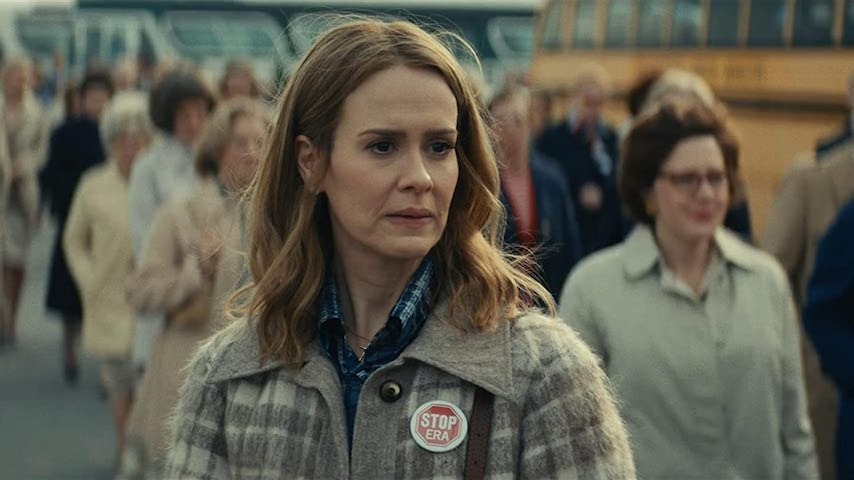
Written by: Dahvi Waller
Directed by: Janicza Bravo
Network: Hulu
For anyone wondering earlier in the season why Sarah Paulson would take on such a seemingly thankless role in Mrs. America, the answer was “Houston.” The convention-set episode was notable for many reasons, but all had to do with Paulson’s sweet, staunchly conservative Alice. From the way that director Janicza Bravo was able to capture the cramped chaos of convention spaces to the moving moments that led Alice to question her politics and—most crucially—her faith in Phyllis and her methods, to the uplifting unity of the 1977 National Women’s Convention, “Houston” was an exceptional hour that gave viewers both a physical and emotional journey that could have been a movie unto itself. One of the best things about Mrs. America is how complicated and nuanced it allowed the portrayals of its many disparate women to be. Alice didn’t just have an epiphany after accidentally eating a pot brownie and start marching alongside Gloria Steinem. But she did start to realize that a radicalization of emotional issues is not the way to move forward and achieve real progress. That in the end, despite their differences, all of the women at the conference really wanted one thing: the freedom to make their own decisions about the lives, be they Democrats or Republicans. And that is really no small thing. —Allison Keene
“End Game,” The Queen’s Gambit
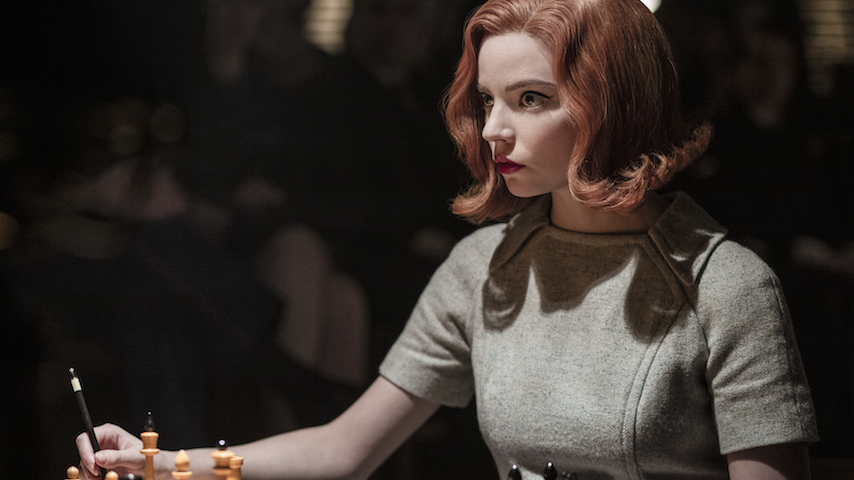
Written by: Scott Frank
Directed by: Scott Frank
Network: Netflix
There are many wonderful standout scenes and episodes in The Queen’s Gambit’s short, taught run of episodes, but its finale really is a narrative and stylistic crescendo worthy of specific praise. We see Beth Harmon (Anya Taylor-Joy) finally facing off against her Soviet opponent, but more importantly, there was the beginning of a true found-family experience for Beth, where she trusts and accepts the support of others. Most movingly, the episode ended with Beth re-experiencing the pure joy of the game; it’s her hobby, her job, and her relaxation all at once. Connecting that back to her first experience learning it with Bill Camp’s Mr. Shaibel (and his pride in her) was as heartbreaking as it was triumphant. For a show that was secretly a sports movie, “End Game” was the perfect emotional conclusion: tense, rousing, heartwarming, and beautifully resonate. Plus, more great chess faces. “Harmon!” —Allison Keene
“The Gang Deals with Alternate Reality,” The Good Fight
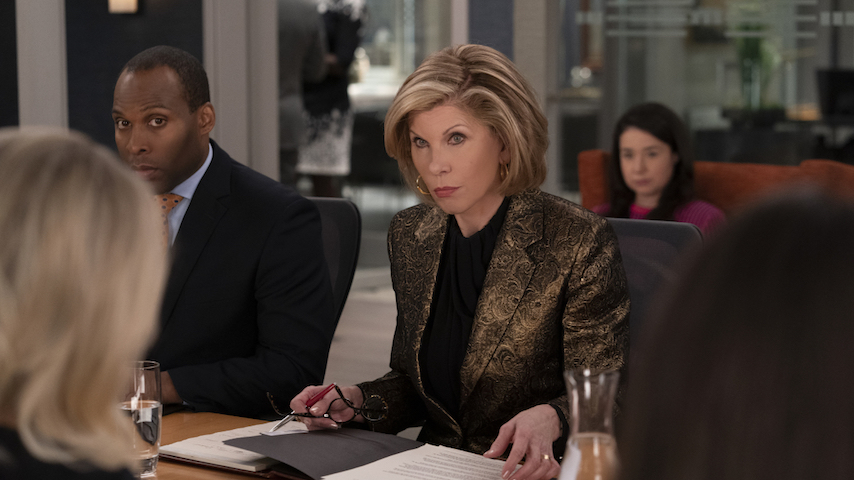
Written by: Robert King and Michelle King
Directed by: Brooke Kennedy
Network: CBS All Access
Diane (Christine Baranski) and her fabulous statement necklaces entered The Twilight Zone in the fourth season premiere of the stellar CBS All Access drama. With her perfectly coiffed hair and outfits to-die-for, Diane, in a warped bizzaro recreation of the series pilot, wakes up to a world where Hillary Clinton won in 2016. Great, right? All our problems are solved. Not so fast. In a trippy, mind-bending hour, the show explores what might have been and the unintended consequences of a Hillary victory. To her utter surprise, Diane finds that maybe, just maybe, something good has come out of the Trump presidency. It’s a world where no one has ever heard of Brett Kavanaugh (Merrick Garland and Elizabeth Warren are Supreme Court Justices) but it’s also a world where Harvey Weinstein was awarded the Presidential Medal of Freedom and the “Me Too” movement never happened. Is it possible that there is an actual silver lining to the four years of horror we’ve all had to endure? The Good Fight continues to provide the group therapy we all need to deal with the current administration. It’s the fever dream we’ve been waiting for.—Amy Amatangelo
“The Uncanny,” Little Fires Everywhere
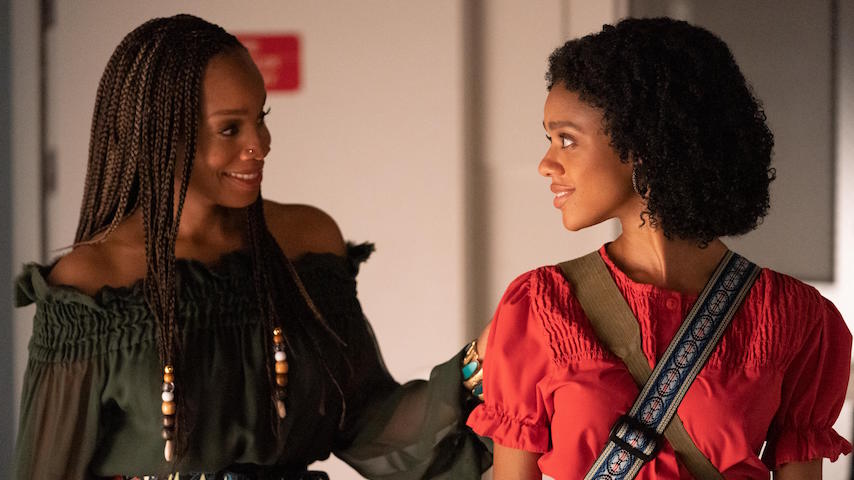
Written by: Shannon Houston
Directed by: Geeta Patel
Network: Hulu
In a series that stars both Reese Witherspoon and Kerry Washington, it feels strange to single out the one episode of the series that contains neither of them as the best hour of Little Fires Everywhere, and yet, “The Uncanny” is just that. A 1980s-set flashback that finally reveals the truth about Mia’s pregnancy and Elena’s early career, it’s also an episode that illustrates how many unexpected parallels exist in the stories of the two women. “The Uncanny” is an engrossing story of choices, opportunities, and the roads we didn’t take, but will spend the rest of our lives always wondering if maybe we should have.
It’s also an honest look at the hard realities of what it means to be a mother, particularly regarding women asked to bear the brunt of childcare and sacrifice their dreams in the name of their families. Elena may be a great journalist, but she’s passed over for promotion repeatedly thanks to her multiple maternity leaves. Mia may love her professor Pauline, but she leaves her behind when she decides to keep the baby she was paid to serve as a surrogate for. Though these two women are completely at odds in the show’s present-day setting, their lives didn’t always look so different from one another, a reality which adds complex layers to both their stories.
Bonus points to AnnaSophia Robb and Tiffany Boone, who knock the difficult task of playing younger versions of Witherspoon and Washington out of the park. —Lacy Baugher
“A Parks and Recreation Special,” Parks and Recreation
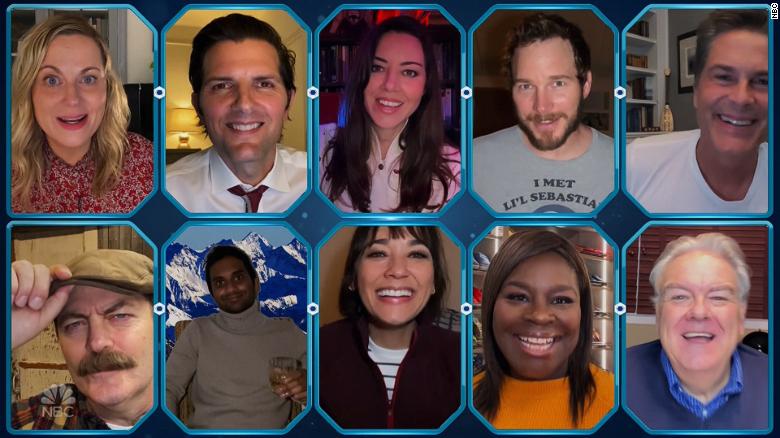
Written by: Michael Schur, Megan Amram, Dave King, Joe Mande, Aisha Muharrar, Matt Murray, Jen Statsky
Directed by: Morgan Sackett
Network: NBC
In the midst of a global pandemic, sometimes all you want is a little comfort from the Before Times. Whether or not you cried at the full-cast rendition of “Bye, Bye Lil Sebastian” (I definitely did), seeing all of our favorite current and former Pawnee residents was a true delight. Reunions are tricky at the best of times, but this virtual meetup that doubled as a fundraiser arrived at the perfect time and in the perfect way. Weird, nostalgic, sweet and genuinely funny (with Ron stealing the show per usual), Twitter was alight all week in anticipation, and later, in appreciation. Not just an innovative way to tackle filmmaking and social distancing (as one of the first of several series to do so), the reunion was the exact mood-booster we needed. Bye, bye Parks and Rec cast (again) and your Grizzl points. We miss you in the saddest fashion. —Allison Keene
For all the latest TV news, reviews, lists and features, follow @Paste_TV.